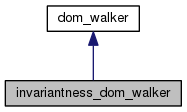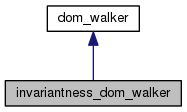

Public Member Functions | |
| invariantness_dom_walker (cdi_direction direction) | |
| virtual void | before_dom_children (basic_block) |
| void | walk (basic_block) |
| virtual void | after_dom_children (basic_block) |
Detailed Description
For each statement determines the outermost loop in that it is invariant,
- statements on whose motion it depends and the cost of the computation.
- This information is stored to the LIM_DATA structure associated with
- each statement.
Constructor & Destructor Documentation
|
inline |
References NULL.
Member Function Documentation
|
inlinevirtualinherited |
Function to call after the recursive walk of the dominator children.
Reimplemented in eliminate_dom_walker, rewrite_update_dom_walker, strlen_dom_walker, rewrite_dom_walker, nontrapping_dom_walker, dom_opt_dom_walker, uncprop_dom_walker, and single_def_use_dom_walker.
|
virtual |
Determine the outermost loops in that statements in basic block BB are invariant, and record them to the LIM_DATA associated with the statements. Callback for dom_walker.
Look at PHI nodes, but only if there is at most two. ??? We could relax this further by post-processing the inserted code and transforming adjacent cond-exprs with the same predicate to control flow again.
Make sure to note always_executed_in for stores to make
store-motion work. If divisor is invariant, convert a/b to a*(1/b), allowing reciprocal
to be hoisted out of loop, saving expensive divide. If the shift count is invariant, convert (A >> B) & 1 to
A & (1 << B) allowing the bit mask to be hoisted out of the loop
saving an expensive shift.
Reimplemented from dom_walker.
|
inherited |
Walk the dominator tree.
Recursively walk the dominator tree. BB is the basic block we are currently visiting.
Don't worry about unreachable blocks.
Callback for subclasses to do custom things before we have walked
the dominator children, but before we walk statements. Mark the current BB to be popped out of the recursion stack
once children are processed. NULL is used to mark pop operations in the recursion stack.
Callback allowing subclasses to do custom things after we have
walked dominator children, but before we walk statements.
References bb_postorder, inverted_post_order_compute(), last_basic_block, n_basic_blocks, and postorder_num.
The documentation for this class was generated from the following file:
